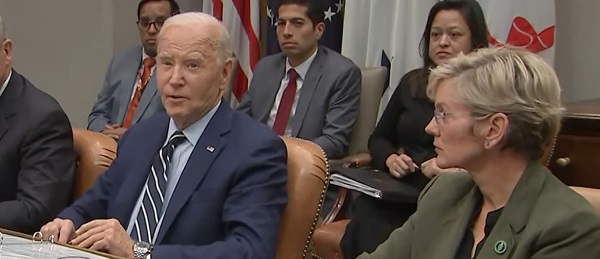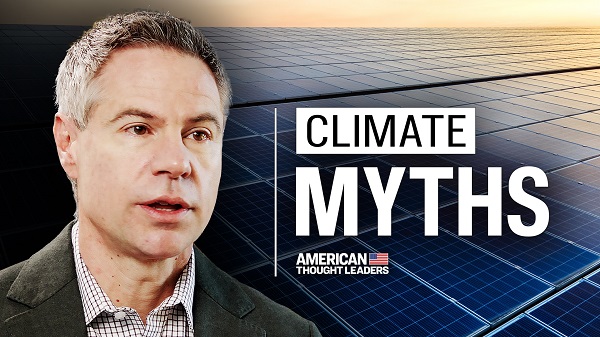Daily Caller
Trump’s ‘Big, Beautiful Bill’ Smashes Biden’s Signature Climate Law Into Pieces


From the Daily Caller News Foundation
By David Blackmon
After an all-night bargaining session, the House of Representatives passed the “One Big Beautiful Bill Act” in the wee hours of Thursday morning on a mainly party-line vote.
“It quite literally is again Morning in America,” House Speaker Mike Johnson said on the House floor following the vote. “After four long years of President Biden’s failures, President Trump’s America first agenda is finally here.”
Among many key provisions where energy is concerned, the bill eliminates subsidies for wind and solar installations contained in the Orwellian Inflation Reduction Act (IRA) of 2022 faster than previous versions would. The previous bill draft would have phased them out starting in 2029. The new version eliminates them in full at the end of 2026 – any proposed projects not permitted by that time would become ineligible for the credit. Projects that meet the permitting deadline would have to begin generating electricity no later than the end of 2028 or face elimination of their subsidies.
Naturally, boosters of intermittent, unreliable electricity generation from wind and solar installations immediately rolled out messaging claiming that the elimination of the subsidies would spell an end to their industry’s growth in the United States, a claim that may well be accurate.
What they don’t seem to realize is that by using these talking points, they are admitting that their industry lacks a business case for continued expansion. Any business model that cannot survive without taking in an unending stream of government rents is a business model that deserves to fail.
The significance of the prospective elimination of the IRA credits was starkly illustrated by big data and analysis firm Enverus in a report released in early May, its “2025 Interconnection Queue Outlook.” In that report, Enverus details the critical impact those subsidies have had on the rapid growth of wind and solar since 2022, while also resulting in huge backup queue for interconnection in the various U.S. regional power grids.
Enverus’s researchers point out that “generous tax credits from the Inflation Reduction Act and the EPA’s update to 40 CFR Part 60, which mandates additional coal retirements, have significantly boosted demand for renewable energy projects across the United States.” Indeed, the “surge in investment and development” in the past three years has been so substantial that it “has overwhelmed interconnection queues, with a record number of projects seeking grid connections.”
This reality has created a situation in which developers of proposed wind and solar arrays must often wait in line for years before being approved for grid interconnection. As a result, Enverus finds that “[o]nly a fraction of capacity in the interconnection queues are expected to reach operation.” The company’s gradient-boosting machine learning model estimates that just “~10% of projects will successfully come online in the next three years.”
If Enverus’s analysis is right – and the company has a strong track record – just 10% of the projects already in the queue will be able to meet the end-of-2028 deadline contained in the House bill passed Thursday. This reality would essentially eliminate any hope that projects planned to be permitted in future years could benefit from the IRA largesse.
The same House bill passed Thursday also enhances the ability for new nuclear projects to access the IRA’s enhanced investment tax credit. The IRA only allowed access to the credit for nuclear projects once they begin delivering electricity as the Biden administration and Democrat congress of 2022 strove to disadvantage all alternatives to their client renewables industries. The new House version would allow such projects to access the tax credit immediately upon start of construction, a provision strongly preferred by Energy Secretary Chris Wright.
In an exchange with Tennessee Republican Sen. Bill Hagerty on Wednesday, Wright told the Senate Appropriations Subcommittee on Energy and Water Development that nuclear is “the critical technology that could scale wildly beyond where it is today, which is just electricity production into huge scale…I am all in with you on advancing nuclear…Nuclear is the [energy source] that could burst through.”
Where energy is concerned, the One Big Beautiful Bill Act presents a nod to the realities of a dramatically changed political landscape, and to the fact that the energy alternatives favored by the previous administration won’t do the job. Elections do still matter in America.
David Blackmon is an energy writer and consultant based in Texas. He spent 40 years in the oil and gas business, where he specialized in public policy and communications.
Daily Caller
Protesters Storm Elite Climate Summit In Chaotic Scene


From the Daily Caller News Foundation
Baton-wielding protesters stormed the COP30 summit in Belem, Brazil, on Tuesday, with video showing some dressed in indigenous outfits, according to multiple reports.
The COP30 summit is the 30th annual meeting of parties to the United Nations’ Framework Convention on Climate Change (UNFCC), an agreement to reach “net-zero” carbon emissions by 2050, according to the conference’s website. Video posted on X and aired by the BBC showed the protesters kicking doors and forcing their way into the building.
WATCH:
Dear Readers:
As a nonprofit, we are dependent on the generosity of our readers.
Please consider making a small donation of any amount here.
Thank you!
Two security guards were injured in the fracas, with one being taken out in a wheelchair while holding his stomach, Sky News reported.
Past COP summits have seen speakers propose taxes on the meat and dairy industry and “climate finance” initiatives for less-developed countries. The Biden administration signed on to a pledge to start “transitioning away from fossil fuels” at the United Nations COP28 climate summit on Dec. 13, 2023.
Democratic Gov. Gavin Newsom of California attended the summit, where he labeled President Donald Trump “an invasive species” and “a wrecking-ball president” who was “doubling down on stupid.” Newsom also announced an agreement between California and Nigeria, which was declared a “country of particular concern” due to persecution of Christians.
Daily Caller
Ex-Terrorist Leader Goes On Fox News, Gives Wild Answer About 9/11


From the Daily Caller News Foundation
Nearly 3,000 people died across New York City, Washington, D.C., and Shanksville, Pa. during the 9/11 attacks, according to the Pew Research Center. When asked directly on “Special Report with Bret Baier” if he regrets the attack, al-Sharaa distanced himself entirely from the event.
“I was only 19 years old, so I was a very young person, and I didn’t have any decision-making power at that time, and I don’t have anything to do with it,” al-Sharaa said. “And al-Qaeda was not present right then in my area. So you’re speaking to the wrong person about this subject.”
Dear Readers:
As a nonprofit, we are dependent on the generosity of our readers.
Please consider making a small donation of any amount here.
Thank you!
The Syrian leader then shifted the conversation.
WATCH:
“We mourn for every civilian that got killed, and we know that people suffer from the war, especially civilians who pay the price, a hefty price for the war,” al-Sharaa said.
President Donald Trump hosted al-Sharaa at the White House on Monday, welcoming the former al-Qaeda member who once fought U.S. forces in Iraq and served time in Abu Ghraib prison. The U.S. government removed al-Sharaa from its terror list just days before his meeting with Trump, according to CBS News.
Al-Sharaa, who led a rebel coalition that toppled Bashar al-Assad’s regime in December 2024 while heading the militant group Hayat Tahrir al-Sham, has since recast himself as a pro-Western reformer. Legacy media outlets have described his government as “moderate” compared to Assad’s rule.
The visit marks the first time a Syrian head of state has entered the White House since Syria gained independence in 1946, NPR reported. Trump, during a speech in Saudi Arabia, said in May that he would lift U.S. sanctions on Syria.
-

 Digital ID2 days ago
Digital ID2 days agoCanada moves forward with digital identification for federal benefits seekers
-

 espionage2 days ago
espionage2 days agoChinese-Owned Trailer Park Beside U.S. Stealth Bomber Base Linked to Alleged Vancouver Repression Case
-

 Alberta2 days ago
Alberta2 days agoSchool defunding petition in Alberta is a warning to parents
-

 Business2 days ago
Business2 days agoLiberals refuse to disclose the amount of taxpayer dollars headed to LGBT projects in foreign countries
-

 Daily Caller2 days ago
Daily Caller2 days agoLaura Ingraham Presses Trump On Allowing Flood Of Chinese Students Into US
-

 Crime1 day ago
Crime1 day agoCBSA Bust Uncovers Mexican Cartel Network in Montreal High-Rise, Moving Hundreds Across Canada-U.S. Border
-

 Daily Caller2 days ago
Daily Caller2 days agoUS Nuclear Bomber Fleet Shares Fence With Trailer Park Linked To Chinese Intel-Tied Fraudster
-

 Environment1 day ago
Environment1 day agoThe Myths We’re Told About Climate Change | Michael Shellenberger




